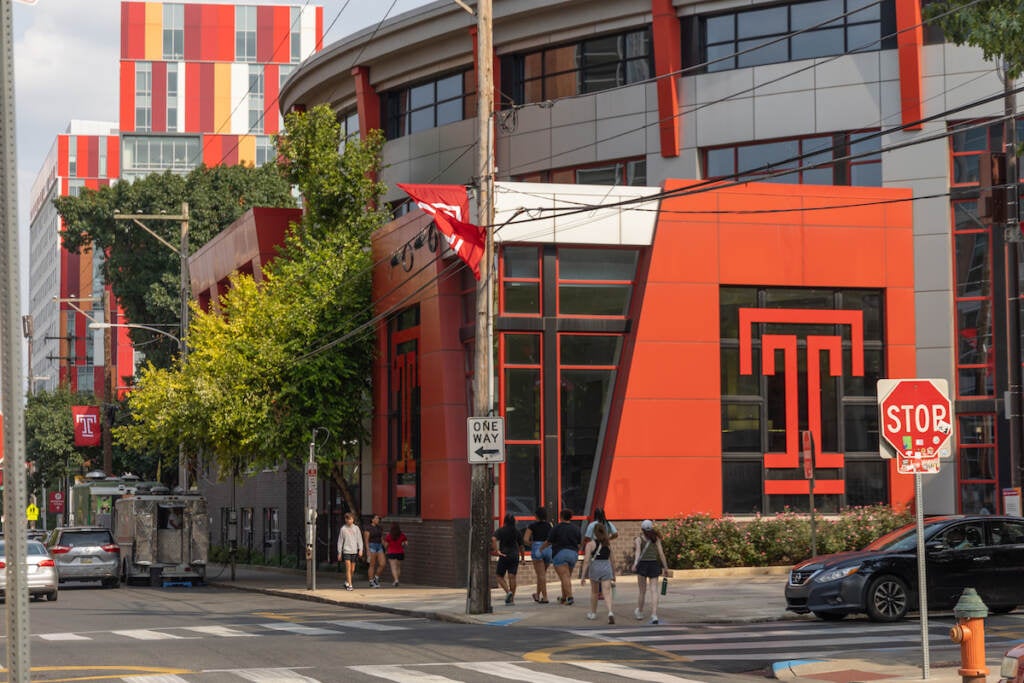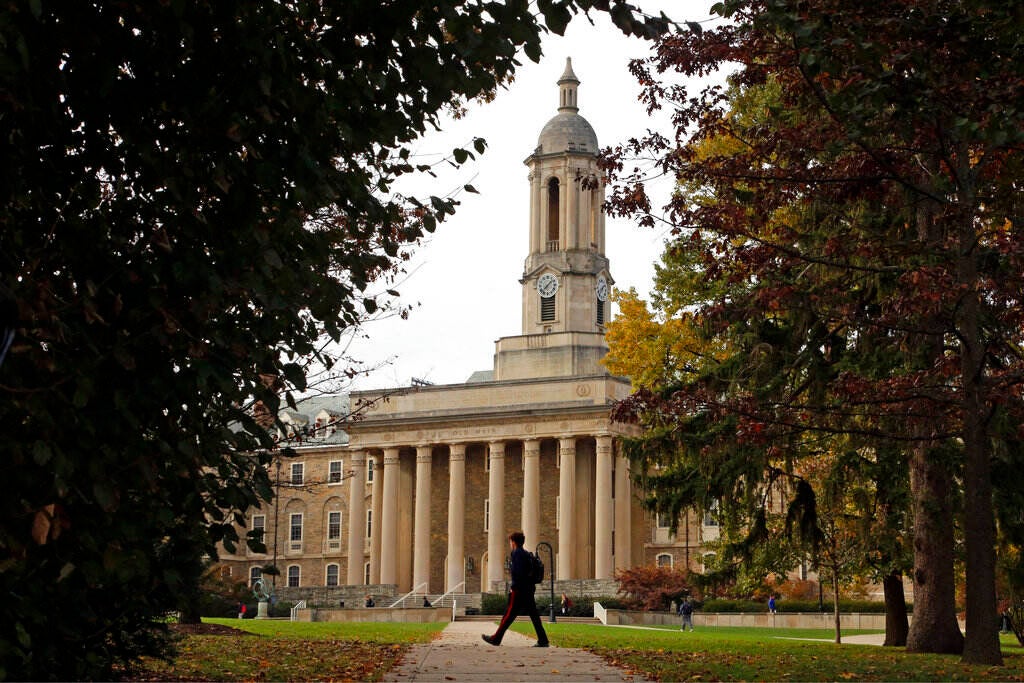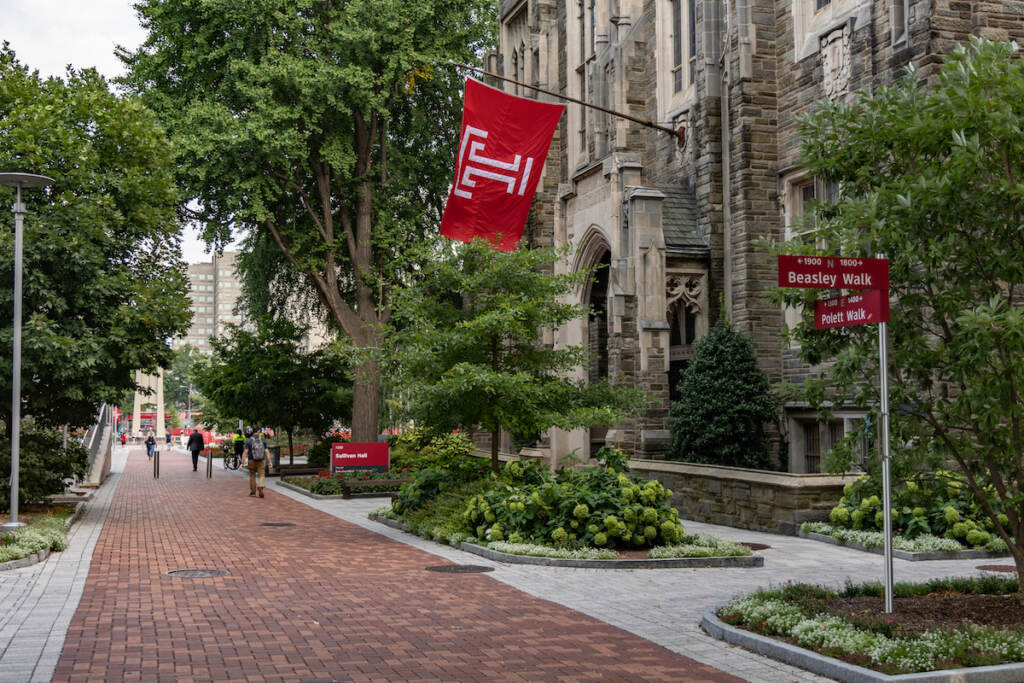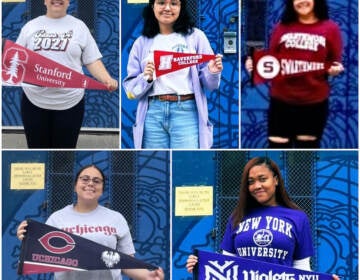Pa. ranks No. 2 in the nation for higher ed credit card marketing deals
Two dozen universities and alumni associations across Pa. participate in credit card marketing agreements — the most lucrative of which can yield millions.
Listen 3:12
Temple University’s campus in Philadelphia, Pa. (Kimberly Paynter/WHYY)
The trusted relationship between universities and their students when it comes to credit card consumption is raising a red flag for some undergraduates in Philadelphia.
Federal data shows that after graduation, universities and alumni associations target students for affinity credit cards. Years ago, even undergraduate students were offered school affiliated credit cards, internal agreements show.
The cards bear the school names and logos, and the bank pays a percentage of each purchase made with the card to the institution, whether a college or alumni group.
But is this an affinity for young consumers to rack up debt? WHYY found two dozen willing institutions across Pennsylvania.
While other states have few universities participating in such credit card marketing agreements — there’s no shortage in Pa. — it ranks second in the nation for such deals, according to the Consumer Financial Protection Bureau data.
The most lucrative deals can yield millions for higher education institutions and the alumni groups who participate. Sometimes the deals include banking products, ATMs, branches, extensive marketing and branding plans.
Some include exclusive rights to campus presence in exchange for royalty payments for each customer.
“I think we’re seeing a lot of schools offering a lot of different types of financial products, whether those are financial products offered by third party financial institutions or products offered by the schools themselves,” said Julia Barnard, markets and policy analyst for the Consumer Financial Protection Bureau.
Publicly available data only dates back to 2009, when the federal government enacted the CARD Act, which prohibits financial institutions from marketing and issuing credit cards to individuals younger than age 21 without a cosigner.
In 2009, there were more than 163,200 individuals with university and alumni association branded credit cards in their wallets across Pennsylvania. The market size steadily declined to 10,400 one decade later before the COVID-19 pandemic began. The most recent available data in 2020 shows just 7,707 accounts statewide.
Schools have amended these contracts over the years — early contracts with universities such as the University of Pennsylvania, Temple University, and Villanova University explicitly included undergraduate student credit card accounts — but more recent ones show students have been pushed aside for the more flush alumni who are the new focus.
Temple University spokesperson Steve Orbanek released a statement where he says in part “students were excluded from this agreement when the applicable law was amended.”

Temple partnered in a deal with Bank of America until July 2021 but the bank did not renew the agreement. Nor did the college seek a new financial sponsor.
“Temple University has no intention of revisiting these programs in the future,” the statement continued.
Officials also made it clear if they were to revisit the program “all applicable disclosure and consumer protection laws would be followed,” according to the statement.
Barnard, with the Consumer Financial Protection Bureau, said that students and alumni put a lot of stock in endorsements from their alma mater.
“We have also a lot of evidence that students do see their institutions as acting in their best interests. Schools are a really trusted intermediary,” she said. “I think students rely on those endorsements in a certain way. Which is why, of course, it’s important to have transparency to understand the types of agreements that are going on between the institutions [of higher education] and the financial institutions.”
Bank of America’s subsidiary FIA Card Services N.A. was the biggest player in the credit card market. Other issuers included U.S. Bank. In 2020, the Pennsylvania State Employees Credit Union dominated the market with all but two agreements.
Bank of America and U.S. Bank did not respond to a request by WHYY News for an interview.
Pennsylvania State Employees Credit Union declined an interview request for this story but submitted a statement.
“We see our extensive partnerships with universities and alumni associations as an avenue to connect with young adults at a critical time in their financial lives, and to continue that connection beyond college,” said Kate Moyer, spokesperson for Pennsylvania State Employees Credit Union. “Our presence on campuses and outreach to alumni groups enables us to expand on our convenient digital-first service model by being right there where those university members are.”
The most lucrative contract statewide for university affinity credit cards is the Penn State Alumni Association which has been under contract consistently between 2010 and 2020. During that period, the alumni association was paid $20 million in royalties by Bank of America’s FIA Card Services. In 2018, there were 46,167 active affinity accounts.
In 2019, the Penn State Alumni Association inked a deal with the Pennsylvania State Employees Credit Union which paid $3 million to the association in 2019 and 2020. There were only 1,075 active affinity accounts on file in 2020. That deal, worth $15 million over 10 years, won’t expire until 2029. The contract explicitly excludes students who have not yet graduated from marketing lists.
Spokesperson Ben Manning from Penn State issued this statement:
“Credit cards bearing the Penn State Alumni Association (PSAA) name are marketed to Penn State alumni, not Penn State students in any way. Proceeds from these affiliations have allowed the PSAA to financially support scholarships at Penn State as well as professional mentoring programs for students and alumni.”

Higher education institutions who participate in affinity credit card deals also reap hefty benefits.
For example, Temple University was under contract with Bank of America’s subsidiary FIA Card Services for a student and alumni marketing agreement each year between 2009 and 2020.
During that time frame, the university was paid $1.2 million in royalties by Bank of America. As of 2020, 1,504 active affinity credit card accounts existed.
The contract detailed the bank was permitted to use the university logo on T-shirts, hats, bobblehead toys and other promotional gifts to individuals for completing a credit card application.
A contract signed in 2014 did not specify whether the bank could market to university students or collect royalties. In 2019, the contract was amended to clarify that the bank would not pay royalties for student credit card accounts and marketing lists would not include students.

In February 2021, Bank of America informed the university that after “a comprehensive review of the program” the bank would not renew the deal and it would expire in July 2021.
But in 2007, before the transparency law was enacted, records show Temple’s agreement did include students and continued to do so until 2013.
Temple junior Aryianna Miller says she’s received numerous offers for credit cards through her credit union.
“I know a lot of college students. In my first semester I had crazy spending habits, whether party, (or) uber, they could swipe now and pay later. A lot of people say they are going to pay later but they don’t. That is a quick way to get into debt and have bad credit.”

She is adamant she doesn’t want to go into more debt by using credit cards.
“A lot of college students don’t know how hard it is to build your credit back up once it’s bad, or how it affects a lot of things when you are an adult. Lack of financial literacy is why they are targeting college students.”

Another university in the Philadelphia region, Villanova University was also under contract with Bank of America and FIA Card Services each year between 2009 and 2019. The university was paid $2.5 million during that decade. In 2019, there were 3,360 active affinity credit card accounts.
Villanova’s contract was explicit that it would not provide the bank with a marketing list of undergraduate or graduate students. The university’s aim was to recruit alumni association members, faculty and staff instead — a list with more than 86,000 names — according to the contract.
“Villanova University did not, and does not, market any consumer credit card products to enrolled students at either the undergraduate or graduate level,” said Krissy Woods, director of public relations for Villanova in a statement. “This includes during the terms of the University’s agreement with Bank of America, which expired in 2020. Villanova has not since entered any such affinity partnership.”
But in 2000, years before federal law discouraged it, Villanova’s agreement did include students. Records show it wasn’t until 2014 that any change was implemented.
The University of Pennsylvania was also under contract with Bank of America and FIA Card Services each year between 2009 and 2018. During that stretch, the university was paid $3.8 million in royalties from the bank for affinity credit cards. At its peak, there were 11,882 accounts in 2009 but that dropped to 6,802 accounts by 2018. The contract detailed that the university supplied marketing lists of employees, alumni, and others to the bank, totaling 125,000 individuals at least 18 years old and older.
The bank was permitted to use the university logo on promotional gifts for individuals who filled out credit card applications, according to the contract.
UPenn’s contract did not explicitly specify whether students could be solicited for credit cards.
“We have not offered a personal credit card since the agreement expired in 2019,” said Ron Ozio, director media relations of the University of Pennsylvania in an email. “Under that Agreement the card was marketed as the Penn Alumni Card, not a student card.”
But in an earlier contract dating back to 1997 and as recently as 2014, UPenn did include undergraduate students in its affinity credit card program, a policy that has since changed.

Instead, UPenn is under contract with PNC, which pays royalties to the university of at least $200,000 each quarter for the ability of students to link their University ID card to a PNC checking or savings account to pay for goods and services on campus.
PNC declined to comment on the contract, which does not include credit cards.
Anyone with concerns or issues regarding their credit card accounts can file an online complaint with the Consumer Financial Protection Bureau to investigate.

Get daily updates from WHYY News!
WHYY is your source for fact-based, in-depth journalism and information. As a nonprofit organization, we rely on financial support from readers like you. Please give today.








